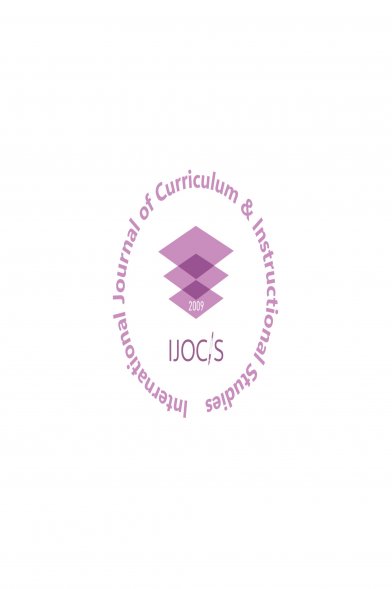InvestigationofEthnopedagogicalFactorsinTeacherEducation: KyrgyzstanSample
InvestigationofEthnopedagogicalFactorsinTeacherEducation: KyrgyzstanSample
Thepurposeofthisstudyistoinvestigatetheethnopedagogyeducationin the teacher education programs in Kyrgyzstan. Basic qualitative research methodwasappliedinthestudy.Thedatawerecollectedthroughdocument reviewand interviewswithgraduate students from Kyrgyz-TurkishManas Universityandinstructors.TheresearcherstayedinBishkek,Kyrgyzstanfor 50 days to collect the data, the documents and to plan and conduct the interviews. The data collected via document review and interviews, were analyzedbycontentanalysismethod.Asaresultoftheanalysis,information abouttheethnopedagogyclassatKyrgyz-TurkishManasUniversityteacher education program was reviewed and the instructors’ opinions about ethnopedagogyeducationatteachereducationprogramsandthegraduate students’opinionsabouttheethnopedagogyclasswereidentified.Themost important result can be seen as that instructors and students give great importance to ethnopedagogy and adopt its ideas. They also indicated furtherinsightandconcreteproposals.Asacountrywithadeepand rich history, it would be a great chance for Turkey to benefit from this educationalexperience.
___
- Afanasyev, V. (1966). The development of school and pedagogical thinking in Yakutia. Republic of Sakha: Sakha book publishing.
- Alimbekov, A. (2007). Etnopedagojı ̇ve Kırgız etnopedagojisinin temel kavramları. Türk Yurdu, 27(242), 31-36.
- Alimbekov, A. (2012). Kyrgyz ethnopedagogy: student book for higher and secondary educational institutions providing pedagogical education. Bishkek.
- Alimbekov, A. (2015). Kırgızistan'da öğretmen yetiştirme programlarının etnopedagojik yönden gelişimi. Uluslararası 3. Eğitim Programları ve Öğretim Kongresi’nde sunulan bildiri, Adana: Çukurova Üniversitesi.
- Anwar-Hafid, Amiruddin, Suardika, K. Sartono, & Peribadi (2015). An analysis of kalosara function as ethnopedagogic media in nation character-building in south east Sulawesi. International Research Journal of Emerging Trends in Multidisciplinary, 1(9), 1-15.
- Atatürk Araştırma Merkezi. (2006). Söylev ve demeçler. Ankara: ATAM. Gashimov, A. S. & Sadigov, F. B. (1970). Azerbaijani folk pedagogy. Baku: Azer Nashr.
- Indiati, I., Rosilawati, A., Sarwi, Hartono, & Prayito, M. (2020). Ethnopedagogy Oriented Learning Model. Advances in Social Science, Education and Humanities Research, International Conference on Science and Education and Technology (ISET 2019), 443, 79-82. Doi: 10.2991/assehr.k.200620.015
- Khanbikov, J. I (1967). Educational thought history of Tatar people. Kazan: Tatar Book Publishing.
- Kuzmin, V. K., Krylov, D. A., Komelin, & V. A., Kuzmin, N. V. (2014). Ethnopedagogical competence of teachers: criteria, indicators and level of development. Modern problems of science and education, (5).
- Latyshina, D. N., & Khayrullin, P. Z. (2014). Etnopedagogika. Moskova: Yurayt Publishing House.
- Merriam, S. B. (2009). Qualitative research: A guide to design and implementation (2nd ed.). San Francisco, CA: Jossey-Bass.
- Miles, M. B., & Huberman, A. M. (1994). Qualitative data analysis: An expanded sourcebook. Thousand Oaks, CA: Sage.
- Shavadi, A. (2015). New information technologies in ethnopedagogical process. In Application of Information and Communication Technologies (AICT), 9th International Conference, IEEE, (pp. 595- 599). Doi: 10.1109/ICAICT.2015.7338630
- Volkov, G. N. (1974). Etnopedagıgıka. Çeboksarı.
- Volkov, G. N. (1958). Chuvash folk pedagogy. Cheboksary: Chuvashgosizdat.
- Zaydullina, N. N. (2015). Role of labour education in the ethnopedagogics in the modern World. Young Scientist USA, 4, 29-31.
- ISSN: 2146-3638
- Yayın Aralığı: 2
- Başlangıç: 2011
- Yayıncı: Eğitim Programları ve Öğretim Derneği
